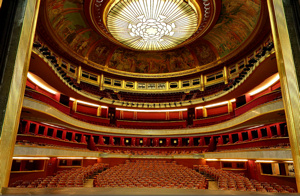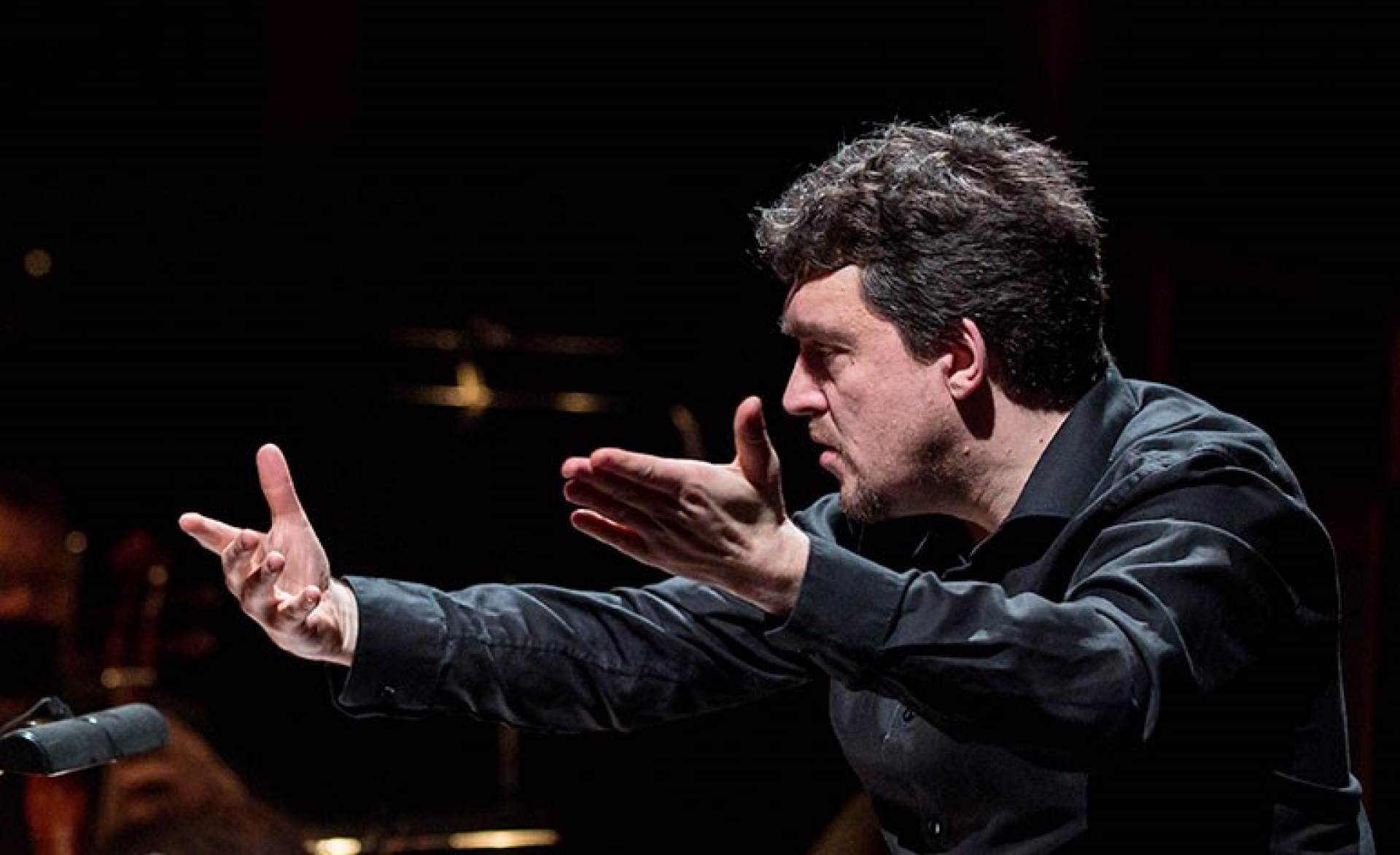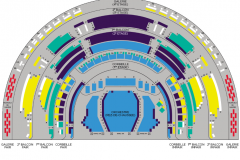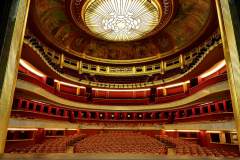Don Giovanni
Mo | Tu | We | Th | Fr | Sa | Su |
Seductive and rapacious, pursued and pursuer, a cynical rake who has seduced one thousand and three women in Spain alone, he is ever-triumphant but ultimately damned. Don Giovanni is proudly described as a dramma giocoso. This oxymoron is difficult to translate as there is a strong contradiction, but as we delve deeper, we discover a delightful swirl of ambiguities. Nothing is quite what it seems: libertinage is praised, but couples meet and go their separate ways. Fate plays with masks, right up until the final challenge. Alexis Kossenko at the helm of his ensemble, Les Ambassadeurs-La Grande Ecurie, will deliver a subtle musical gem featuring a young cast led by Florian Sempey.
Synopsis
Act 1
The overture begins with a thundering D minor cadence, followed by a short misterioso sequence which leads into a light-hearted D major allegro.
Scene 1 – The garden of the Commendatore
Leporello, Don Giovanni's servant, complains of his lot ("Notte e giorno faticar" – "Night and day I slave away"). He is keeping watch while Don Giovanni is in the Commendatore's house attempting to rape or seduce the Commendatore's daughter, Donna Anna. Don Giovanni enters the garden from inside the house, pursued by Donna Anna. Giovanni is masked and Donna Anna insists on knowing his true identity (Trio: "Non sperar, se non m'uccidi, Ch'io ti lasci fuggir mai!" – "Do not hope, unless you kill me, that I shall ever let you run away!"); before he can break free from her grasp she cries for help. The Commendatore appears and forces Giovanni to fight a duel while Donna Anna flees to seek help. Giovanni kills the Commendatore with his sword and escapes with Leporello. Anna, returning with her fiancé, Don Ottavio, is horrified to see her father lying dead in a pool of his own blood. She makes Ottavio swear vengeance against the unknown murderer. (Duet: "Ah, vendicar, se il puoi, giura quel sangue ognor!" – "Ah, swear to avenge that blood if you can!").
Scene 2 – A public square outside Don Giovanni's palace
Giovanni and Leporello arrive and hear a woman (Donna Elvira) singing of having been abandoned by her lover, on whom she is seeking revenge ("Ah, chi mi dice mai" – "Ah, who could ever tell me"). Giovanni starts to flirt with her, but it turns out he is the former lover she is seeking. The two recognize each other and she reproaches him bitterly. He shoves Leporello forward, ordering him to tell Elvira the truth, and then hurries away.
Leporello tells Elvira that Don Giovanni is not worth her feelings for him. He is unfaithful to everyone; his conquests include 640 women and girls in Italy, 231 in Germany, 100 in France, 91 in Turkey, but in Spain, 1,003 ("Madamina, il catalogo è questo" – "My dear lady, this is the catalogue"). In a frequently cut recitative, Elvira vows vengeance.
Scene 3 – The open country
A marriage procession with Masetto and Zerlina enters. Don Giovanni and Leporello arrive soon after. Giovanni is immediately attracted to Zerlina, and he attempts to remove the jealous Masetto by offering to host a wedding celebration at his castle. On realizing that Giovanni means to remain behind with Zerlina, Masetto becomes angry ("Ho capito! Signor, sì" – "I understand! Yes, my lord!") but is forced to leave. Don Giovanni and Zerlina are soon alone and he immediately begins his seductive arts (Duet: "Là ci darem la mano" – "There we will entwine our hands").
Elvira arrives and thwarts the seduction ("Ah, fuggi il traditor" – "Flee from the traitor!"). She leaves with Zerlina. Ottavio and Anna enter, plotting vengeance on the still unknown murderer of Anna's father. Anna, unaware that she is speaking to her attacker, pleads for Giovanni's help. Giovanni, relieved that he is unrecognised, readily promises it, and asks who has disturbed her peace. Before she can answer, Elvira returns and tells Anna and Ottavio that Giovanni is a false-hearted seducer. Giovanni tries to convince Ottavio and Anna that Elvira is insane (Quartet: "Non ti fidar, o misera" – "Don't trust him, oh sad one"). As Giovanni leaves, Anna suddenly recognizes him as her father's murderer and tells Ottavio the story of his intrusion, claiming that she was deceived at first because she was expecting a night visit from Ottavio himself, but managed to fight Giovanni off after discovering the imposture, leading to the events we have already witnessed (long recitative exchange between Anna and Ottavio, leading to Anna's aria: "Or sai chi l'onore Rapire a me volse" – "Now you know who wanted to rob me of my honour"). Ottavio, not yet convinced (Anna having only recognised Giovanni's voice, not seen his face), resolves to keep an eye on his friend ("Dalla sua pace la mia dipende" – "On her peace my peace depends").
Leporello informs Giovanni that all the guests of the peasant wedding are in Giovanni's house and that he distracted Masetto from his jealousy, but that Zerlina, returning with Elvira, made a scene and spoiled everything. However, Don Giovanni remains cheerful and tells Leporello to organize a party and invite every girl he can find. (Giovanni's "Champagne Aria": "Fin ch'han dal vino calda la testa" – "Till they are tipsy"). They hasten to his palace.
Scene 4 – A garden outside Don Giovanni's palace
Zerlina follows the jealous Masetto and tries to pacify him ("Batti, batti o bel Masetto" – "Beat, O beat me, handsome Masetto"), but just as she manages to persuade him of her innocence, Don Giovanni's voice from offstage startles and frightens her. Masetto hides, resolving to see for himself what Zerlina will do when Giovanni arrives. Zerlina tries to hide from Don Giovanni, but he finds her and attempts to continue the seduction, until he stumbles upon Masetto's hiding place. Confused but quickly recovering, Giovanni reproaches Masetto for leaving Zerlina alone, and returns her temporarily to him. Giovanni then leads both offstage to his ballroom. Three masked guests – the disguised Ottavio, Anna, and Elvira – enter the garden. From a balcony, Leporello invites them to his master's party. They accept the invitation and Leporello leaves the balcony. Alone, Ottavio and Anna pray for protection, Elvira for vengeance (Trio: "Protegga il giusto cielo" – "May the just heavens protect us").
Scene 5 – Don Giovanni's ballroom
As the merriment, featuring three separate chamber orchestras on stage, proceeds, Leporello distracts Masetto by dancing with him, while Don Giovanni leads Zerlina offstage to a private room. When Zerlina screams for help, Don Giovanni tries to fool the onlookers by dragging Leporello into the room and threatening to kill him for assaulting Zerlina. But Ottavio produces a pistol, and the three guests unmask and declare that they know all. But despite being denounced on all sides, Don Giovanni escapes – for the moment.
Act 2
Scene 1 – Outside Elvira's house
Leporello threatens to leave Giovanni, but his master calms him with a peace offering of money (Duet: "Eh via buffone" – "Go on, fool"). Wanting to seduce Elvira's maid, and believing that she will trust him better if he appears in lower-class clothes, Giovanni persuades Leporello to exchange cloak and hat with him. Elvira comes to her window (Trio: "Ah taci, ingiusto core" – "Ah, be quiet unjust heart"). Seeing an opportunity for a game, Giovanni hides and sends Leporello out in the open wearing Giovanni's cloak and hat. From his hiding place Giovanni sings a promise of repentance, expressing a desire to return to her and threatening to kill himself if she does not take him back, while Leporello poses as Giovanni and tries to keep from laughing. Elvira is convinced and descends to the street. Leporello, continuing to pose as Giovanni, leads her away to keep her occupied while Giovanni serenades her maid with his mandolin. ("Deh vieni alla finestra" – "Ah, come to the window").
Before Giovanni can complete his seduction of the maid, Masetto and his friends arrive, searching for Giovanni with the intent of killing him. Giovanni (still disguised as Leporello) convinces the posse that he also hates Giovanni, and joins the hunt. After cunningly dispersing Masetto's friends (Giovanni aria: "Metà di voi qua vadano" – "Half of you go this way"), Giovanni takes Masetto's weapons away, beats him up, and runs off, laughing. Zerlina arrives and consoles the bruised and battered Masetto ("Vedrai carino" – "You'll see, dear one").
Scene 2 – A dark courtyard
Leporello abandons Elvira. (Sextet: "Sola, sola in buio loco" – "All alone in this dark place"). As he tries to escape, Ottavio arrives with Anna, consoling her in her grief. Just as Leporello is about to slip through the door, which he has difficulty finding, Zerlina and Masetto open it and, seeing him dressed as Giovanni, catch him before he can escape. When Anna and Ottavio notice what is going on, all move to surround Leporello, threatening him with death. Elvira tries to protect the man who she thinks is Giovanni, claiming that he is her husband and begging for pity. The other four are resolved to punish the traitor, but Leporello removes his cloak to reveal his true identity. He begs for mercy and, seeing an opportunity, runs off (Leporello aria: "Ah pietà signori miei" – "Ah, have mercy, my lords"). Given the circumstances, Ottavio is now convinced that Giovanni was the murderer of Donna Anna's father (the deceased Commendatore) and swears vengeance ("Il mio tesoro" – "My treasure" – though in the Vienna version this was cut). Elvira is still furious at Giovanni for betraying her, but she also feels sorry for him. ("Mi tradì quell'alma ingrata" – "That ungrateful wretch betrayed me").
Scene 3 – A graveyard with the statue of the Commendatore.
Leporello tells Don Giovanni of his brush with danger, and Giovanni taunts him, saying that he took advantage of his disguise as Leporello by trying to seduce one of Leporello's girlfriends. But the servant is not amused, suggesting it could have been his wife, and Don Giovanni laughs aloud at his servant's protests. The voice of the statue warns Giovanni that his laughter will not last beyond sunrise. At the command of his master, Leporello reads the inscription upon the statue's base: "Here am I waiting for revenge against the scoundrel who killed me" (Dell'empio che mi trasse al passo estremo qui attendo la vendetta). The servant trembles, but the unabashed Giovanni orders him to invite the statue to dinner, threatening to kill him if he does not. Leporello makes several attempts to invite the statue to dinner but for fear cannot complete the task (Duet: "O, statua gentilissima" – "Oh most noble statue"). It falls upon Don Giovanni himself to complete the invitation, thereby sealing his own doom. Much to his surprise, the statue nods its head and responds affirmatively.
Scene 4 – Donna Anna's room
Ottavio pressures Anna to marry him, but she thinks it inappropriate so soon after her father's death. He accuses her of being cruel, and she assures him that she loves him, and is faithful ("Non mi dir" – "Tell me not").
Scene 5 – Don Giovanni's chambers
Giovanni revels in the luxury of a great meal, served by Leporello, and musical entertainment during which the orchestra plays then-contemporary late-18th-century operatic music: "O quanto in sì bel giubilo" from Vicente Martín y Soler's Una cosa rara (1786), "Come un agnello" from Giuseppe Sarti's Fra i due litiganti il terzo gode (1782) and finally, "Non più andrai" from Mozart's own The Marriage of Figaro (1786). (Finale "Già la mensa preparata" – "Already the table is prepared"). Elvira appears, saying that she no longer feels resentment for Giovanni, only pity. ("L'ultima prova dell'amor mio" – "The final proof of my love"). Surprised by her lack of hatred, Giovanni asks what it is that she wants, and she begs him to change his life. Giovanni taunts her and then turns away, praising wine and women as the "support and glory of humankind" (sostegno e gloria d'umanità). Hurt and angry, Elvira gives up and leaves. A moment later, her scream is heard from outside the walls of the palace, and she returns only to flee through another door. Giovanni orders Leporello to see what has upset her; upon peering outside, the servant also cries out, and runs back into the room, stammering that the statue has appeared as promised. An ominous knocking sounds at the door. Leporello, paralyzed by fear, cannot answer it, so Giovanni opens it himself, revealing the statue of the Commendatore. With the D minor cadences from the overture now accompanying the bass voice ("Don Giovanni! A cenar teco m'invitasti" – "Don Giovanni! You invited me to dine with you"), the Commendatore offers a last chance to repent, but Giovanni adamantly refuses. The statue disappears and Don Giovanni cries out in pain and terror as he is surrounded by a chorus of demons, who carry him down to Hell. Leporello, watching from under the table, also cries out in fear.
Donna Anna, Don Ottavio, Donna Elvira, Zerlina, and Masetto arrive, searching for the villain. They find instead Leporello hiding under the table, shaken by the supernatural horror he has witnessed. Giovanni is dead. Anna and Ottavio will marry when Anna's year of mourning is over; Elvira will spend the rest of her life in a convent; Zerlina and Masetto will finally go home for dinner; and Leporello will go to the tavern to find a better master.
The concluding ensemble delivers the moral of the opera – "Such is the end of the evildoer: the death of a sinner always reflects his life" ("Questo è il fin di chi fa mal, e de' perfidi la morte alla vita è sempre ugual"). In the past, the final ensemble was sometimes omitted by conductors (such as Gustav Mahler) who claimed that the opera should end when the title character dies. However, this approach has not survived, and today's conductors almost always include the finale in its entirety. The return to D major and the innocent simplicity of the last few bars conclude the opera.
Program and cast
Sung in Italian, with French and English surtitles
Running time approx. 3 hours
Florian Sempey | Don Giovanni
Ana Maria Labin | Donna Anna
Léo Vermot-Desroches | Don Ottavio
Marion Lebègue | Donna Elvira
Edwin Fardini | Leporello
Catherine Trottmann | Zerlina
Louis Morvan | Il Commendatore / Masetto
Alexis Kossenko | direction
Orchestre et Chœur Les Ambassadeurs~La Grande Ecurie
Théâtre des Champs-Élysées

The Théâtre des Champs- Elysées is undoubtedly one of the finest venues in Paris . Built in 1913 , it has the distinction of having been designed by a group of artists architects Henry Van de Velde and Auguste Perret , the painter and sculptor Antoine Bourdelle , the painter Maurice Denis , and the crystal- René Lalique to do mention the main ones . He was the first Parisian theater to be built entirely of reinforced concrete.
Restoration of the Great Hall devoted to operatic performances , symphony concerts and dance was decided in 1985. Two years later , on 23 September 1987, the theater reopened its doors , completely renovated. Fifteen years after this important work it was decided to undertake a new renovation campaign , but to prevent the complete closure of the theater for an entire season , work is now carried by step during the summer . Then it is to replace aging equipment , to remedy wear certain parts of the theater and improve spectator comfort and artists during their visit . Thus in recent years, including the work involved the renovation of marble facade, replacing the carpet in the room with wooden floors , installation of a new fully decorated wooden concert to a significant improvement of acoustics, the orchestra pit and stage below .
The Théâtre des Champs- Elysées is now a modern working tool receiving each year nearly 300,000 spectators and a few thousands of artists and collaborators.
The Théâtre des Champs- Elysées , the jewel of French architecture of the twentieth century, was in 1953 one of the first buildings of contemporary architectural heritage to be classified as historic monuments . Since 1970 the Caisse des Dépôts owns the entire building 15 avenue Montaigne and principal patron of the theater.
For over a century, Théâtre des Champs-Elysées has been the place where the most celebrated artists have come to make their names in Paris. The world’s finest orchestras and world-class soloists have always been a fixture at the Theatre. Théâtre des Champs-Elysées presents more than 200 concerts each year and is renowned for its outstanding performances of all genres, from classical music concerts and staged opera to contemporary dance and jazz.
How to reach us:
Subway: Alma-Marceau (line 9), Franklin D.Roosevelt (line 1), Pont de l’Alma (RER line C)
Bus: n° 42, 63, 72, 80, 92
Taxi station: Place de l’Alma, corner of avenue George V
Car park: Alma George V. The entrance is in front of n° 19, avenue George V
Fixed rate depending on the length of the performance. Payment upon entering.

 EN
EN DE
DE IT
IT FR
FR ES
ES RU
RU JP
JP RO
RO
 Seating plan
Seating plan 